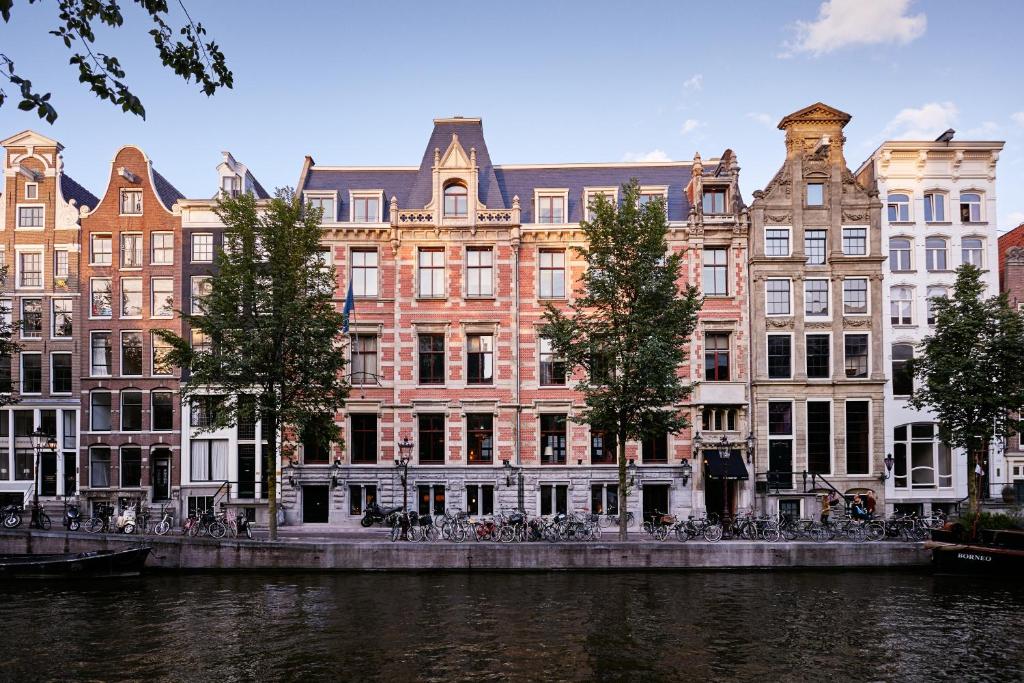Discover Iconic Hotels Beyond the Lobby
Turn a stay at a famed hotel into a lived-in, local experience: use neighborhood knowledge, staff rapport, and offbeat routines to move beyond marble staircases and buffets, weaving genuine everyday rhythms into your visit for memories that feel like home.
What You’ll Need
Inside LA’s Westin Bonaventure: Hollywood’s Iconic Filming Location
Research Like a Local, Not a Tourist
Why skim the brochure when you can unearth the neighborhood’s best-kept secrets?Spend time on hyperlocal sources before you arrive. Search neighborhood blogs, community forums, and local newspapers to find the everyday places locals recommend.
Look for recurring names for cafes, markets, and artisans. Check transit maps and walking times instead of trusting hotel proximity claims.
Pin favorite spots in your maps app and save offline directions. Prioritize regular rhythms — morning markets, evening bars, weekday routines — so your mini itinerary feels lived-in, not touristy. This groundwork creates a mini itinerary that prioritizes local rhythms and avoids tourist traps.
Build Rapport with Hotel Staff
A friendly bellhop can unlock insider tips — and sometimes a better room.Introduce yourself warmly at check-in and state sincere intentions — exploring the neighborhood, supporting local businesses, or attending a specific event — so staff can tailor suggestions.
Ask staff for personal recommendations rather than generic top-ten lists; try questions like, “Where do you eat after a shift?” or “Which corner shop has the best pastries?”
Tip thoughtfully: a small cash tip or a handwritten thank-you can foster goodwill and occasionally unlock perks like room upgrades, late check-outs, or reservations at booked restaurants.
Keep a record of names and short notes so you can follow up during your stay.
Adopt Local Routines, Not Just Attractions
Eat when the locals eat, stroll where they stroll — feel the city’s tempo.Observe daily patterns: note when locals have coffee, when shops open, and where people gather after work. Walk the block early to see bakeries fill up, or linger by a tram stop to watch morning rhythms.
Swap the hotel breakfast for a neighborhood café; order what regulars order and ask the barista for the house specialty. Pop into nearby markets for fresh snacks and chat briefly with vendors — a single tip or question opens conversation.
Use public transit or walk instead of defaulting to taxis to catch street-level life and unexpected discoveries.
Schedule downtime aligned with local habits — an afternoon siesta, an evening aperitivo — to blend your schedule with the city’s natural flow and experience the hotel as part of the neighborhood, not an island.
Turn Hotel Spaces into Local Hangouts
Think of the lobby as a living room — can it feel like yours for a few days?Bring a book and linger in the lobby during slow hours; smile and start a conversation with staff or a fellow guest. Join hotel-hosted events — readings, music nights, or tasting pop-ups — to meet residents and makers. Use the bar during local happy hour to gather neighborhood tips and swap recommendations.
Ask the concierge to book small, locally run experiences — walking tours, hands-on classes, or home-cooked meals — so the hotel becomes a bridge to authentic encounters.
Support Local Businesses Consciously
One small coffee shop visit multiplies into cultural connection — and better memories.Seek out independently owned cafes, restaurants, shops, and galleries instead of international chains. Ask the concierge, bartender, or barista for neighborhood staples — a family-run bistro, a hole-in-the-wall pastry shop, or the seasonal street-food stall locals rave about.
Try house specialties and seasonal dishes: order the chef’s daily special, taste the market fish, or buy a single handmade ceramic mug from the artist behind the counter. When possible, buy small souvenirs directly from makers, tip service workers generously, and book local guides or walking tours straight from the operator.
You’ll deepen your cultural exchange, support the local economy, and hear personal stories you won’t find in guidebooks.
Document and Share Responsibly
Leave a trail of helpful, respectful tips — become the good kind of travel source.Keep brief notes of standout places, staff names, and moments you loved so you can replicate or recommend them later. Write quick prompts in your phone: e.g., “Carlos — espresso + best 9–11am seat,” or “Rooftop garden — sunset, free after 6.”
Credit local businesses and people when posting. Credit by tagging the business, linking its site, and naming staff who consent. Avoid revealing fragile or private locations (don’t map secret gardens or backrooms). Include practical details like hours, price ranges, accessibility, and best times to visit.
Leave thoughtful reviews naming helpful staff and useful specifics to guide future travelers.
Stay Like a Neighbor
A memorable hotel stay blends curiosity, respect, and everyday habits; with small efforts before and during your trip, you can experience iconic hotels like locals do—richer, warmer, and more memorable. Try it, then share your stories and tips with friends.












Small gripe: the guide mentions ‘Document and Share Responsibly’ but doesn’t give examples of what crosses the line. There’s a difference between sharing a photo of a café and posting exact coordinates of a secret spot.
Would love a short checklist: what to post, what to omit, how to credit locals.
Good point — we’ll add a checklist. Short answer: don’t share GPS for hidden spots, ask permission before posting people, tag businesses rather than individuals unless you have consent.
Also consider using privacy settings on photos and avoid posting opening times if it’s a one-person-run place — that can cause extra stress for owners.
Agree — once a hidden beach got overwhelmed after a viral post. Oof. Better to share vibes and how to get there generally (e.g., ‘walk past the pier and head left’), not precise coordinates.
Not gonna lie, ‘Research Like a Local’ took me down a rabbit hole last night. Ended up learning slang instead of where to eat. 😆
But seriously, learning a few phrases changed interactions — hotel staff warmed up when I tried the local greeting. 10/10 recommend.
Same — I learned three phrases and the concierge was impressed. Also opened doors to better recommendations.
Haha, slang rabbit holes are real. Even a simple ‘hello’ or ‘thank you’ in the local language can make a big difference — glad it worked for you.
Love this. Also use pronunciation guides or quick audio clips so you don’t butcher it too badly 😂
Quick practical: when building rapport with hotel staff, I always ask if there’s a shift they’d like recognition for (e.g., who cooks the best breakfast). Then I leave a note at front desk praising that person. It usually gets passed on and makes someone’s day.
Be careful with food in staff areas — some hotels have strict rules. But a written note or a review mentioning a staff member is safe.
Nice idea. I sometimes leave a small treat in the breakfast kitchen with a note (with permission). It’s a small gesture that goes far.
Lovely practice, Julian. Personalized recognition means a lot — appreciate the tip.
This guide made me nostalgic. I remember staying at a big historic hotel and the night manager showed me how to get morning pastries at a family pastry shop around the corner — felt like I was staying with relatives.
5-line minimum:
The guide’s tone is spot-on. It encourages curiosity without demanding you be a perfect ‘local’.
I tried the ‘stay like a neighbor’ tip and it changed how I travel.
Also, be kind to staff — they’re human and have off days.
Worth trying on your next weekend trip!
Love that story, Nora — that’s exactly the kind of experience we hoped to inspire. Thanks for sharing!
So sweet. Those small local tips make trips memorable. Also, pastry recommendations please? 😋
Question: for ‘Adopt Local Routines, Not Just Attractions’, how do you balance doing local stuff vs seeing iconic sights? Like, I want the museum but also want to grocery shop like a local.
Balance is key. Mix and match: schedule big sights for mornings and leave afternoons for wandering neighborhood markets or cafes. Or alternate days—sightseeing one day, living like a neighbor the next.
I split days too. Museums early (less crowds), then stroll to a nearby neighborhood for lunch and market hopping. Works well.
I loved the section ‘Turn Hotel Spaces into Local Hangouts’ — why does everyone instantly migrate to the tourist traps? Imagine turning the lobby bar into your evening coworking spot and meeting locals.
One caution: respect the hotel’s other guests and staff schedules. Not every lobby wants to be your living room 😂
I’ve had great conversations at breakfast buffets — more natural than the bar for me. Less loud, more daytime vibes.
Exactly! Lobbies can be social hubs, but reading the room matters. Glad you enjoyed that tip.
Ha, agreed — had a guy set up a full board game night once and it got weird. Soft boundaries help.
Anyone else nervous about “Build Rapport with Hotel Staff”? I worry about coming off fake if I try too hard. What’s the sweet spot? 😅
Great question, Liam. The sweet spot is simple: be genuine and respectful. A friendly greeting, a bit of curiosity about recommendations, and a thank-you note go a long way without feeling forced.
I feel you. I usually ask one or two open questions — like favorite nearby coffee spot — and let the convo flow. If they seem busy, I keep it short.
Neutral take: the guide is great but reads a little idealistic in parts. Not every hotel or neighborhood is open to tourists trying to blend in — some places are private or residential and that’s okay.
Still, the principles are sound if applied with sensitivity.
Fair point, Zoe. We’ll add more nuance about respecting residential privacy and when to step back.
Yes — sometimes ‘stay like a neighbor’ means keeping a low profile and supporting discreetly.
Agreed. Not every place wants tourists blending in, and that’s part of respecting a locale.
Constructive thought: guide could include a short bit on safety and boundaries when ‘turning hotel spaces into hangouts.’ Not everyone wants to be approached, and cultural norms vary.
Otherwise, useful and fun read.
You’re right, Camila. We’ll expand that section to cover consent, cultural norms, and how to read social cues.
Also note hours — many lobbies quiet down late and staff appreciate guests respecting quiet times.
I second that. In some places, approachability equals intrusion. Short etiquette pointers would help.
Wanted to add: ‘Support Local Businesses Consciously’ is underrated. I try to buy one thing from small shops every day of a trip. It’s small but feels purposeful.
Also, leave honest reviews for the places you liked — that actually helps them more than selfies do.
Same here. I also tip a little extra when I can — especially for helpful concierge or porters who went above and beyond.
Good point on reviews. I try to include a photo of the place (no people) so others can find it easily.
Yes, reviews are super valuable, especially for tiny businesses. Thanks for the actionable advice, Ethan.
Love this guide — especially the bit about ‘Research Like a Local, Not a Tourist.’ I tried that once: scoped neighborhood Facebook groups and a few local blogs before a trip and discovered an amazing bakery that wasn’t on any map apps.
Quick tip: check local event calendars too — small markets or free concerts can make a hotel stay feel like a real neighborhood visit.
Totally agree. I usually search for ‘[city name] community’ or ‘[city name] expats’ on FB. Also check MeetUp for niche activities.
Thanks for sharing, Maya — local Facebook groups are gold. Do you have a favorite way to find those groups for new cities?
Good call on event calendars — also try city’s tourism site. They often list grassroots events that get missed by big sites.
Love the guide but wish there were more examples of local routines — like a sample morning routine in Madrid vs. Tokyo vs. New Orleans. That would be so helpful for first-timers.
Yes please! Even a short bullet list per city would spark ideas.
Great suggestion, Keira — adding sample routines per city/culture is on our to-do list. Thanks!
I might start compiling my own list and share it somewhere. If you want, I can PM a draft.
I tried ‘Document and Share Responsibly’ and learned the hard way: posted a picture of a tiny artist’s studio and the artist messaged me saying too many people showed up asking to buy art. Felt awful.
Now I just ask permission and sometimes blur faces/buildings. Lessons learned.
Good lesson. Community-first sharing is the way to go.
Thanks for the honest share, Rafael. These real-life consequences are important to highlight.
That must have been rough. Asking permission is so simple but often overlooked.
Funny story: tried ‘support local businesses’ in a tiny hotel town and accidentally bought a year’s supply of pickles from a shop owner who loved talking politics. Ended up with 37 jars. Oops.
But seriously, support local is great advice — bring cash if it’s a small place.
37 jars of pickles sounds like a story worth a podcast episode 😂 Glad you had a memorable experience.
Hilarious — but also heartwarming. These interactions are the point of local travel.
Cash tip is golden. Many tiny places prefer cash or have spotty card readers.